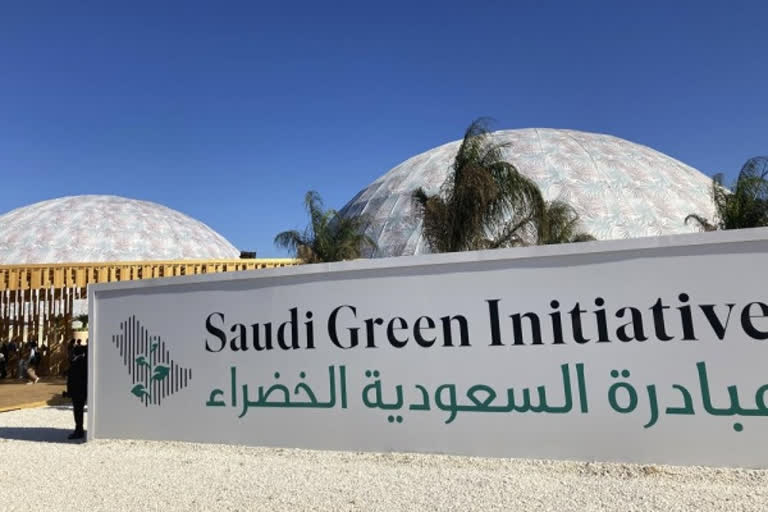Sharm El-Sheikh:Hydrogen cars and vehicles that capture their tailpipe pollutants. Computer mice made from recycled ocean waste plastic. Hundreds of millions of trees are planted in the desert. Saudi Arabia's vision of an environmentally friendly future is on display just a short drive from the venue of the UN climate summit being held in Egypt.
What's not highlighted in the glossy gallery are the earth-warming fossil fuels that the country continues to pump out of the ground for global export. Fossil fuel emissions are the reason why negotiators from nearly 200 countries have gathered at the annual two-week conference, haggling over how pollution can be cut and how fast to do it.
In and around the conference, Saudi Arabia is presenting itself as a leader in green energies and eco-friendly practices, with flashy pavilions, glossy presentations and optimistic assessments of technologies like carbon capture, which can remove carbon dioxide from the air but is costly and years away from being deployed at scale.
We have hugely ambitious goals and targets," Saudi climate envoy Adel al-Jubeir said at the two-day Saudi Green Initiative Forum on COP27's sidelines. We want to be an example to the world in terms of what can be done." The effort is part of a large push by Saudi Arabia, which has some of the world's largest reserves of oil and is a leader of the OPEC oil cartel, to make the case that the nation should be part of the transition to renewable energies while holding on to its role as the top global crude oil exporter.
That vision is sharply contested by climate scientists and environmental experts, who argue that Saudi Arabia and other countries with large reserves of oil simply want to distract the world to continue with business as usual. The Saudi energy minister, Prince Abdulaziz bin Salman al Saud, announced a raft of new green projects or updates to existing ones, from beefed up tree planting pledges to fresh solar energy energy projects in the pipeline.
Crown Prince Mohammed bin Salman launched his Saudi Green Initiative at last year's COP26 conference in Glasgow, Scotland, with a target for net zero greenhouse gas emissions by 2060, which he changed to 2050 at the start of this year's meeting. Still, energy exports are the Saudi economy's mainstay, earning USD 150 billion in annual revenue, despite efforts to diversify revenue as the global transition away from fossil fuel reliance accelerates.
At the Saudi forum, officials and invited guest speakers from renewable energy companies held forth on topics like clean hydrogen, greening the desert, and a futuristic desert city project called Neom. State-owned oil giant Saudi Aramco's CEO, Amin Nasser, said the world needs more investment in oil and gas, not less, a message at odds with the sentiment among many country delegations and climate experts and activists attending COP27.
I'm concerned because of lack of investment in the oil and gas in particular," said Nasser, touching on a frequent theme. Saudi Arabia has resisted calls to urgently phase out fossil fuels, warning that a premature switch has led to price spikes and shortages. Yes, there is good investment happening in the alternatives, such as wind and solar power, he said, adding that the amount of money spent on oil production capacity has fallen to USD 400 billion a year from USD 700 billion in 2014.
That is not enough to meet global demand in the mid to long term, he said. An Aramco spokesman said Nasser wasn't available for an interview. Among the Saudi announcements, there were plans to set up a regional center to advance emissions reductions and one to host a regional climate week ahead of next year's COP meeting.
